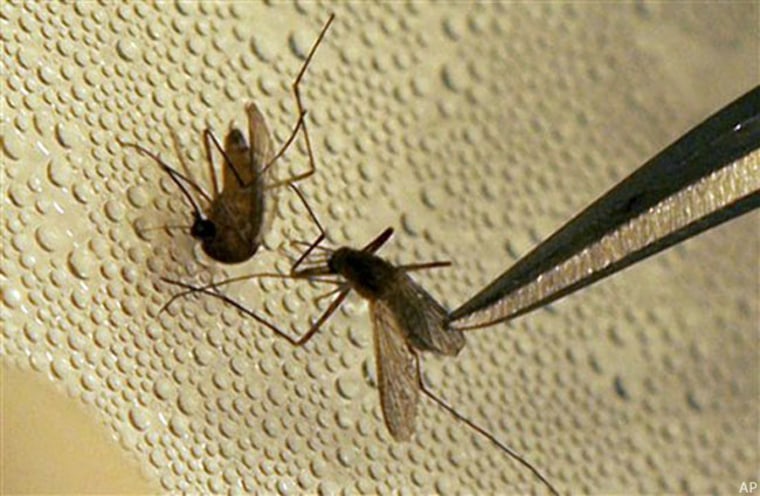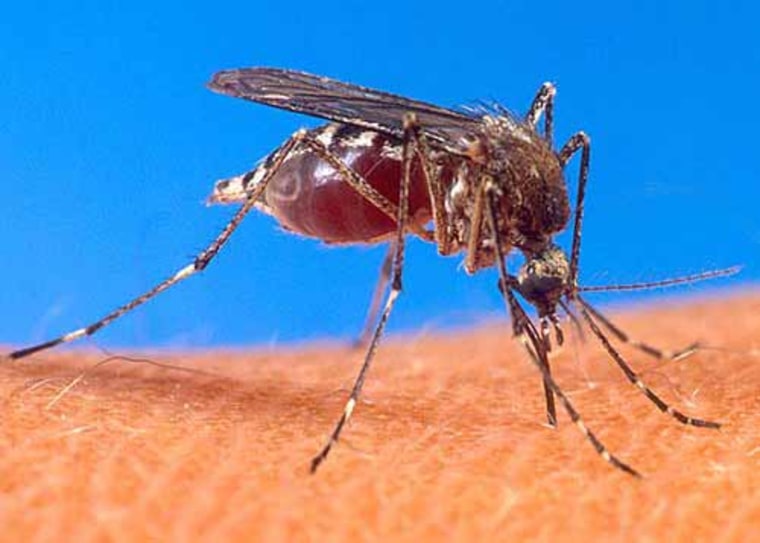As storm clouds begin to lift over the flooded Midwest, experts are predicting an entirely different sort of deluge. Mosquitoes, which can breed out of control in the puddles and pools left behind as flood waters recede, may be poised to add insult to injury.
Midwesterners aren't the only ones ripe for the biting. Mosquitoes are ubiquitous in the United States, living in every state and capable of thriving in all kinds of climates, according to Joseph M. Conlon, technical advisor to the American Mosquito Control Association. Wherever there's standing water, there are mosquitoes, he said. And the diseases they carry, such as West Nile Virus, aren't far behind.
But science has some new solutions in the form of improved repellents, genetically modified mosquitoes, and new approaches to vaccine design, as well as some science-based ideas you can put to use at home.
Control just the mosquito
The big strides in mosquito control have largely involved better eradication and population control efforts, aimed to affect only mosquitoes, leaving other animals intact.
One of the most important developments in this effort was bio-rational control materials, said James Stark, executive director of the Metropolitan Mosquito Control District, the public agency charged with keeping Minneapolis and St. Paul relatively mosquito-free. Developed in the 1980s, these "materials" are actually a strain of naturally occurring wetlands bacteria. The District sprays the bacteria onto lakes and other water sources where mosquito larvae hatch and grow. The larvae then eat the bacteria, which kills them by destroying the walls of the insect's stomach. Only mosquitoes and a few related fly species are susceptible. Other animals, including people, can ingest the bacteria without any damage.

The project, one of the largest in the world, according to Conlon, has had a lot of success with this bacteria, particularly when combined with newer computer database systems that allow the agency to easily map and track areas where the bacteria are needed most.
But a new method, or, rather, a new twist on an old method, is on the horizon.
Sterile insect technique, or SIT, involves breeding large numbers of sterile male insects and then releasing them into the wild. Ideally, the huge influx of sterile males out-compete their normal counterparts in the game of love, creating a whole generation of unfertilized eggs and crashing the insect population. SIT wouldn't eradicate all mosquitoes, but it would keep population levels low enough to control the spread of diseases.
It's a trick that has worked before on other insects, said James Becnel, research entomologist and lead scientist with the USDA's Fly and Mosquito Control Unit. Those past experiments used radiation to sterilize, but that can be problematic with mosquitoes, making them less able to compete for mates.
Now, an English company called Oxytec is pushing a new approach to SIT, using genetically altered mosquitoes. "They have a gene that's sensitive to antibiotics," Becnel said. "You can rear them in the lab with a small amount of antibiotics and grow big numbers. Then, when you release them, there's no wild antibiotics, so the genes are turned on and they become sterile."
This technique could be coming to malaria-stricken Malaysia very soon, according to an article in the May 21 issue of the journal Nature.
Viral vision
Other efforts focus on controlling the ability of living mosquitoes to spread disease among humans. The most obvious way to do this, of course, is through the use of vaccines. But, while there is a vaccine for the tropical Yellow Fever virus, there aren't any for the mosquito-spread illnesses most common in the United States.
In fact, in the case of West Nile Virus, there's a vaccine for horses, but not for people.
This is a funding issue, said the AMCA's Conlon. "Production and distribution of human vaccines is an extraordinarily expensive process and the time investment from concept to commercial production can be as much as 10 years," he said. "There aren't enough people getting sick to make it worthwhile to a company to develop a vaccine."
But a new development in vaccine technology could possibly change that. This week, researchers at Stony Brook University in New York announced they'd developed a new method of designing vaccines that could potentially make the process faster and cheaper.
The researchers, including Steffen Mueller, Bruce Futcher and Steven Skiena, found they could genetically alter viruses to make them weaker and reduce their ability to multiply in the body. In trials, mice fought off a weakened version of polio, leaving them with immunity to the "wild" virus. Details are in the June 26 issue of the journal Science.
The researchers said this method could allow scientists to develop new vaccine candidates much faster than currently possible, basically speeding up the turn-around time between deciding to find a vaccine for a certain virus and having a workable candidate in-hand.
And while much of the expense of developing a vaccine lies in extensive clinical trials, a hurdle which probably won't go away, this new method could cut earlier development costs, and potentially make it possible to create vaccines for diseases that currently don't have one, the researchers said.
Better repellents
Another major area of research is better repellents, which could keep mosquitoes away from people more effectively. Becnel's colleague from the USDA, Ulrich Bernier, along with researchers from the University of Florida, recently made some big breakthroughs in this field.
Using 50 years of data on repellent chemicals, the team trained a brain-based computer program to recognize the molecular structures and components common to effective repellents. Then, they set the program to work analyzing some 2,000 chemical compounds, looking for the ones that shared those traits.
The result was 23 newly synthesized compounds that have the potential to outperform all repellents currently on the market, according to the May 27 issue of the Proceedings of the National Academy of Sciences.
In fact, while the most common current repellent, DEET, remains effective in a closed environment for about 17 days, one of the new compounds stuck it out for 85.
This type of data-mining research isn't new, but how it's being applied is. "The pharmaceutical people have been using this method for years to design drugs, but it's just now that the mosquito people are getting into it too," Becnel said.
Home invasion
Actually, fending off mosquitoes doesn't require lab access. Conlon said that folks at home can play along. All you need to do is follow what he calls the Three D's.
Drain: Mosquito eggs need water to hatch. But they don't need large amounts of water. Conlon has seen the bugs breed in everything from discarded bottle caps to creases on tarps. If you don't want mosquitoes breeding in your backyard, you need to be fastidious about removing all sources of standing water, no matter how small.
Dress: Conlon said mosquitoes can bite through tight clothes and are attracted to dark colors. The ideal mosquito-resistant outfits are ensembles that are loose-fitting, long-sleeved, and light-colored. "In particular, they have a hard time seeing the color yellow," he said. "Yellow bug lights can be useful because of this. They don't repel mosquitoes, but they don't attract them, either."
Defend: There are only four active ingredients currently approved by the Food and Drug Administration to effectively and safely repel mosquitoes: DEET, picaridin, ir3535, and, for those who prefer a plant-based option, oil of lemon eucalyptus. Conlon said it's important to look for these ingredients because there are many mosquito repellents on the market that simply don't work.
"Popular folk remedies like garlic and Vitamin B-1 have been shown to be useless in double blind studies," he said. Others, such as oil of clove, are known repellents, but only at high concentrations that would burn human skin. "So it works, but not at the low levels used in any product. There, it just smells nice," he said.
